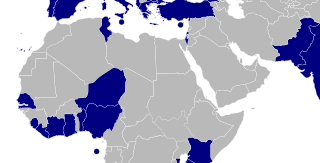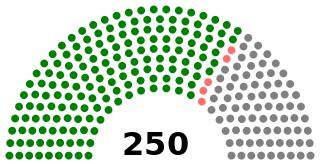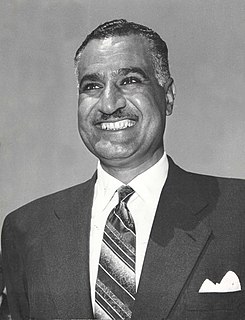
The politics of Egypt is based on republicanism, with a semi-presidential system of government, established following the Egyptian Revolution of 2011, and the resignation of President Hosni Mubarak. The President of Egypt is elected for a maximum of two four-year terms and the Parliament is unicameral and unbiased. The President can appoint up to 5% of the total number of seats in Parliament, and can also dissolve it. Parliament can also impeach the President. Egypt was traditionally ruled by royals until 1952, but the first free elected President was in 2006. The Parliament of Egypt is the oldest legislative chamber in Africa and the Middle East.

The politics of Tunisia takes place within the framework of a unitary semi-presidential representative democratic republic, with a President serving as head of state, Prime Minister as head of government, a unicameral legislature and a court system influenced by French civil law. Between 1956 and 2011, Tunisia operated as a de facto one-party state, with politics dominated by the secular Constitutional Democratic Rally (RCD) under former Presidents Habib Bourguiba and then Zine el Abidine Ben Ali. However, in 2011 a national uprising led to the ousting of the President and the dismantling of the RCD, paving the way for a multi-party democracy. October 2014 saw the first democratic parliamentary elections since the 2011 revolution, resulting in a win by the secularist Nidaa Tounes party with 85 seats in the 217-member assembly.

According to most scholars the history of modern Egypt dates from the emergence of Muhammad Ali's rule in the early 19th century and his launching of Egypt's modernization project that involved building a new army and suggesting a new map for Egypt.
Atiyah, Atiyeh, Attiah, Attieh or Atieh may refer to:

Nazim al-Kudsi, also spelled "Koudsi", "al-Qudsi" or "al-Cudsi", was a Syrian politician who served as the President of Syria from December 14, 1961 to March 8, 1963.

Elections in Egypt are held for the President and a unicameral legislature. The President of Egypt is elected for a four-year term by popular vote.

The National Democratic Party, often simply called in Arabic: الحزب الوطني Al-Ḥizb al-Waṭaniy – the "National Party", was an Egyptian political party. It was founded by President Anwar El Sadat in 1978.

According to the Democracy Index 2016 study, Israel is the only democracy in the Middle East, while Tunisia is the only democracy in North Africa. The measure of the level of democracy in nations throughout the world published by Freedom House and various other freedom indices, the Middle Eastern and North African countries with the highest scores are Israel, Tunisia, Turkey, Lebanon, Morocco, and Kuwait. Countries that are occasionally classified as partly democratic are Egypt and Iraq. The remaining countries of the Middle East are categorized as authoritarian regimes, with the lowest scores held by Saudi Arabia and Yemen.

Parliamentary life in Egypt has been a mark of Egyptian civilizations along its history. In modern history, parliamentary life started as early as 1824 while representative parliamentary life did not start until 1866. In 2016, Egypt celebrated the 150th anniversary of Parliamentary life in their country.

Women in the Arab world live in situations that are rather unique, with special challenges not present in many other parts of the world. In particular these women have throughout history experienced discrimination and have been subject to restrictions of their freedoms and rights. Some of these practices are based on religious beliefs, but many of the limitations are cultural and emanate from tradition as well as religion. These main constraints that create an obstacle towards women's rights and liberties are reflected in laws dealing with criminal justice, economy, education and healthcare.

This timeline lists the dates of the first women's suffrage in Muslim majority countries. Dates for the right to vote, suffrage, as distinct from the right to stand for election and hold office, are listed.

The definition and application of secularism, especially the place of religion in society, varies among Muslim countries as it does among western countries. Secularism is often used to describe the separation of public life and civil/government matters from religious teachings and commandments, or simply the separation of religion and politics. Secularism in Muslim countries is often contrasted with Islamism, and secularists tend to seek to promote secular political and social values as opposed to Islamic ones. Among western scholars and Muslim intellectuals, there are some debates over secularism which include the understanding of political and religious authorities in the Islamic world and the means and degree of application of sharia in legal system of the state.

A presidential election was held in Egypt in two rounds, the first on 23 and 24 May 2012 and the second on 16 and 17 June. The Muslim Brotherhood declared early 18 June 2012, that its candidate, Mohamed Morsi, won Egypt's presidential election, which would be the first victory of an Islamist as head of state in the Arab world. It was the second presidential election in Egypt's history with more than one candidate, following the 2005 election, and the first presidential election after the 2011 Egyptian revolution which ousted president Hosni Mubarak, during the Arab Spring. Morsi, however, lasted little over a year before he was ousted in a military coup in July 2013.

Rawya Ateya was an Egyptian woman who became the first female parliamentarian in the Arab world in 1957.

A parliamentary election to the Syrian People's Council was held in Syria on 7 May 2012, following the approval of a new constitution of Syria, in a referendum on 26 February 2012.

The Arab Spring was a series of anti-government protests, uprisings, and armed rebellions that spread across the Middle East in late 2010. It began in response to oppressive regimes and a low standard of living, beginning with protests in Tunisia. In the news, social media has been heralded as the driving force behind the swift spread of revolution throughout the world, as new protests appear in response to success stories shared from those taking place in other countries. In many countries, the governments have also recognized the importance of social media for organizing and have shut down certain sites or blocked Internet service entirely, especially in the times preceding a major rally. Governments have also scrutinized or suppressed discussion in those forums through accusing content creators of unrelated crimes or shutting down communication on specific sites or groups, such as through Facebook.

The Arab Ba'ath Movement, also literally translated as Arab Resurrection Movement or Arab Renaissance Movement, was the Ba'athist political movement and predecessor of the Arab Socialist Ba'ath Party. The party was first named Arab Ihya Movement literally translated as Arab Revitalization Movement, until 1943 when it adopted the name "Ba'ath". It was founded in 1940 by Michel Aflaq. Its founders, Aflaq and Bitar were both associated with nationalism and socialism.
The Arab Liberation Movement was a Syrian political party founded on 25 August 1952 by the President of Syria Adib Shishakli, during his government was the only legal party in Syria until 1954.

Women played a variety of roles in the Arab Spring, but its impact on women and their rights is unclear. The Arab Spring was a series of demonstrations, protests, and civil wars against authoritarian regimes that started in Tunisia and spread to much of the Arab world. The leaders of Tunisia, Egypt, Libya, and Yemen were overthrown; Bahrain has experienced sustained civil disorder, and the protests in Syria have become a civil war. Other Arab countries experienced protests as well.

Rawya Rageh is a Senior Crisis Adviser for Amnesty International based in New York City. She was previously a broadcast journalist known for her in-depth coverage of notable stories across the Middle East and Africa, including the Iraq War, the Darfur crisis in Sudan, the Saddam Hussein trial, the Arab Spring, and the Boko Haram conflict in Northern Nigeria. Working as a correspondent for the Al Jazeera English network her contribution to the Peabody Award-winning coverage the network provided of the Egyptian Revolution of 2011 and the Arab Spring was documented in the books 18 Days: Al Jazeera English and the Egyptian Revolution and Liberation Square: Inside the Egyptian Revolution and the Rebirth of a Nation. The news story she broadcast on 25 January, the first day of the Egyptian Revolution of 2011, was selected by Columbia University Graduate School of Journalism as one of the "50 Great Stories" produced by its alumni in the past 100 years. In addition to her broadcast reporting, Rageh is an active social media journalist, recognized by the Washington Post as one of "The 23 Accounts You Must Follow to Understand Egypt" and by Forbes Middle East Magazine as one of the "100 Arab personalities with the most presence on Twitter."






















